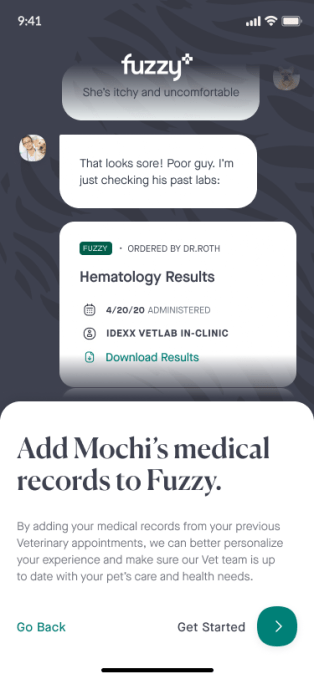Pets are big business. Sales in this area topped $100 billion in 2020, driven by the 48 million dogs and cats that were adopted over the past three years. However, in that same period, only 5,000 new veterinarians were added, causing delays in getting appointments and added stress upon veterinarians to manage their practices.
Today, Fuzzy announced $44 million in growth funding to expand its digital pet care network of veterinary professionals to alleviate some of the strain on the industry and make care accessible and affordable to all. The San Francisco-based company previously raised $18 million in a Series B round in March.
The company, founded in 2016, provides 24/7 live chat and telehealth, ship-to-home prescriptions, vet-curated items in its e-commerce marketplace and educational content and programs. Its digitally-native approach can save pet parents up to $750 a year on healthcare expenses, Zubin Bhettay, co-founder and CEO of Fuzzy, told TechCrunch.
“The big story in 2020 was that everyone needed telehealth services for themselves, and we saw that transfer to pets and then exacerbated by the industry,” he added. “The surge in people getting pets caused emergency room waits to grow to up to 10 hours, while it started taking four to six weeks to get a vet appointment.”
By leading the shift to more telehealth services, Fuzzy hopes to encourage pet parents to consider the health of their pet on a more regular basis to aid in their longevity. The company has facilitated more than 1 million consultations to date and with it, amassed data and operation expertise to be able to expand delivery care at scale.
Bhettay wasn’t planning to raise additional funds so soon after the Series B, but said accelerated growth in the business enabled the company to hire more, check off more of the to-do list items over the past eight months and provided a unique opportunity to lean in on partnerships and expand financial plans.
He expects 2021 revenue growth to be five times over 2020, while Fuzzy memberships, which start for free and then a monthly subscription of $24.99 or annual subscription for $99.99, have increased through partnerships with retailers and vet groups. Bhettay did not reveal the company’s valuation, but did say it was more than a three-time uptick from the Series B round.
The round was led by Icon Ventures, with existing investors Greycroft, Matrix and Crosscut participating, with additional backing from veterinary clinic groups and individuals, including former Chewy chairman Mark Vadon and Clearlake Capital Group founder Jose E. Feliciano. In addition, 25% of the capital was raised from underrepresented communities, Bhettay said.

Fuzzy live chat via its app. Image Credits: Fuzzy
In addition to expanding the vet network — Fuzzy is operational in 25 locations — his plans for the new funding include the development and launch of new product offerings, additional educational content and new member growth.
“We want to see pet care go from once a year to anytime, anywhere,” Bhettay added. “As we think about our vision of becoming the first place where everyone comes to, there are some features and products that we can bring into the business to accelerate that path, as well as acquisitions in the next six to 12 months.”
There are a number of startups tapping into this major trend of pets to capture that household spend in the areas of healthcare, insurance and food. Bhettay is also seeing the larger incumbents focus here, as well as marketing dollars, which he considers validation that the market is shifting to the digitalization of pet care.
Tom Mawhinney, general partner at Icon Ventures, has four dogs himself and felt the pains of having to wait weeks to get them in to see a veterinarian, including having to take one dog to the emergency vet.
He called Bhettay “an energetic and smart entrepreneur” who is building a strong team to go after a space that is ripe for disruption.
“The problems are more exacerbated the more pets that are added to the system, which has not grown in a way to support that,” Mawhinney added. “There needs to be new means for providing care to pets, and Fuzzy is putting in place a bespoke wellness plan that is encouraging interaction to become more frequent and make the overall lives of pets better.”
